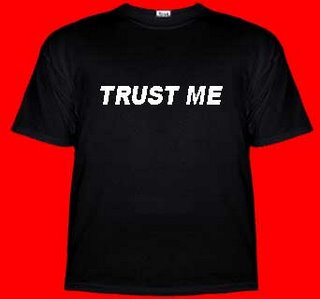"Trust but Verify"

"What it all boils down to is this. I want the new closeness to continue. And it will, as long as we make it clear that we will continue to act in a certain way as long as they continue to act in a helpful manner. If and when they don't, at first pull your punches. If they persist, pull the plug. It's still trust but verify. It's still play, but cut the cards. It's still watch closely. And don't be afraid to see what you see."
-- President Ronald Reagan, speaking about the U.S. relationship with the Soviet Union, in his "Farewell Address to the Nation", delivered January 11, 1989, found on the Reagan Foundation website here.
One day after PA UTA Day (the effective date for the new Pennsylvania Uniform Trust Act) is Election Day in the Commonwealth. Voting results should make the news this day, hopefully not voter fraud (despite Philadelphia's designation, on August 2, 2006, by an advocacy group, as the "No. 1 Election Fraud 'Hot Spot' In America", described in an article found here.)
In this sense, both political elections and fiduciary administrations assume a level of trust and effectiveness that are demanded and, initially, presumed. But things don't always work out that way.
One radio commentator, Barbara Simpson, of San Francisco, wrote on September 10, 2001 (the day before the tragic events of 9/11 occurred in the eastern U.S.), an article entitled "Trust ... but Verify", available at WorldNetDaily here. She compared "trust" against "verification" in a political environment:
Where is it written that just because a country is on good terms with another that there is no skepticism about anything the other says? Who says it’s not sometimes a good idea to check out the other side? Who says that you just acquiesce to the demands of the other side because you are "friends" and because friends trust each other?
That’s nonsense. We all have an obligation to protect ourselves and that applies to countries as well as individuals. It’s all part of covering your backside – protection against the knife in the back. You may not believe it, but even friends betray and act with selfish self-interest. Shakespeare knew that. History is rife with it. “Et tu, Brute?”
Recent generations have bought the line that everyone is the same, no one has ulterior motives and "can’t we all just get along?” The same mentality says being able to protect yourself is wrong because it casts aspersions on other people, as though you don’t trust them. ***
The trouble is, sometimes the stakes are so high that, for your own protection, you need to check things out.
Such is the view of the public regarding many other matters, such as (appropriately on Election Day) electronic voting, for example.
Results were released on October 3, 2006, of a survey conducted by Lehigh University and the Muhlenberg College Institute of Public Opinion, which examined the attitude of Pennsylvania voters towards electronic voting machines. The conclusions were reported in an article entitled "Pennsylvania Voters on E-Voting: Trust, But Verify", posted on October 4, 2006, found online here and here:
[W]hen it comes to e-voting, Pennsylvania voters are following former President Ronald Reagan's famous adage: Trust, but verify.
The survey found that voters overwhelmingly -- more than 80 percent -- agree on the importance of voters having the right to verify on paper that their vote is being counted fairly and accurately. The findings cut across all demographic divides, including party affiliation.
Other major survey findings include:
- The commonwealth's electorate also overwhelmingly believes every Pennsylvania county should use the same kind of voting machine. (91 percent).
- While the majority of voters believe electronic voting systems have been carefully tested and are secure from tampering, more than a third believe it would be easy to rig the systems to alter election results and almost two-thirds do not have a lot of trust that they will accurately count their vote.
- Overall, voters trust electronic voting machines much less than they do ATM machines, but more than they trust making Internet purchases securely or being accurately screened at airport security checkpoints.
As to administration of fiduciary funds for the benefit of others, the recommended national model of a Uniform Trust Code is generally consistent with this attitude -- "Trust but verify". The purpose of the uniform act recommended to states to regulate trust matters is described in detail here. An excellent summary of the original national model UTC is found here. It addresses the need to verify fiduciary functioning in the face of beneficiaries' vulnerability:
A trustee is a fiduciary, sometimes described as the utmost fiduciary. A fiduciary has enforceable obligations to the settlor, beneficiaries or beneficial purpose. There are many kinds of fiduciary relationships in the law. The vulnerability of the beneficiaries or the beneficial interest is the reason that the law imposes special obligations on the trustee as a fiduciary.
So, if you are a beneficiary of a trust, remember that phrase: "Trust but verify".
In Pennsylvania, effective November 6, 2006, the PA Uniform Trust Act -- the Commonwealth's customized version of the recommended UTC -- now enables, statutorily, just such a process of verification, as applied to trustees.

